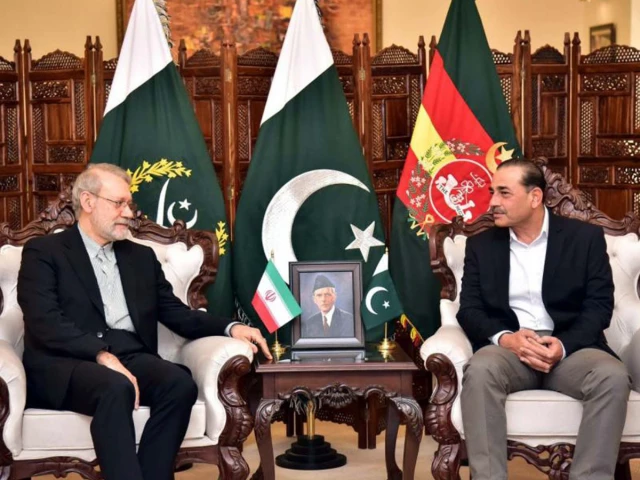Iran’s Supreme National Security Council secretary meets Field Marshal Asim Munir at the GHQ in Rawalpindi
Chief of Army Staff Field Marshal Syed Asim Munir met with Ali Ardeshir Larijani, Secretary of Iran’s Supreme National Security Council, at the General Headquarters on Wednesday, November 26, 2025. Photo: APP
Pakistan and Iran signalled a renewed readiness to work together against terrorism as Chief of Army Staff Field Marshal Syed Asim Munir met Ali Ardeshir Larijani, Secretary of Iran’s Supreme National Security Council, met at the General Headquarters in Rawalpindi on Wednesday.
COAS Munir reiterated Pakistan’s dedication to regional peace and underscored the importance of “closer collaboration with Iran to combat terrorism,” citing evolving geopolitical realities as a driver for deeper strategic ties.
Meanwhile, Larijani lauded Pakistan’s role in regional security and expressed Iran’s willingness to enhance bilateral ties through ongoing dialogue and coordinated security efforts.
Key points discussed
Counter‑terrorism cooperation: Both sides emphasised coordinated efforts to tackle militant threats affecting border regions and the broader neighbourhood.
Strategic and security ties: Given shifting regional geopolitics, both nations pledged to strengthen their defence and intelligence collaboration.
Regional peace and stability through diplomacy: Larijani underlined the significance of dialogue and sustained partnership between Pakistan and Iran to address shared challenges.
Read: Pak-Saudi joint military exercise ‘Al-Battar II’ concludes
The relationship between the two neighbours has seen a marked warming in 2025. In May, Munir visited Tehran and held talks with Major General Mohammad Bagheri, Chief of General Staff of the Iranian Armed Forces, aiming to ramp up military-to-military cooperation, improve border‑security mechanisms, and explore enhanced border‑region trade connectivity.
During the visit of Iran’s foreign minister to Islamabad in January 2024, both countries agreed to establish a joint coordination mechanism and station military liaison officers at the shared border — a confidence‑building measure meant to prevent future escalation and enhance border management.
The renewed overture comes at a time of heightened regional instability with cross‑border militancy, shifting alignments and ongoing pressures across South and West Asia. For both Islamabad and Tehran, transforming sporadic tactical coordination into a structured, strategic partnership could help manage security threats proactively and stabilise their shared border.
Additionally, deeper cooperation — military, intelligence, and diplomatic — could pave the way for broader collaboration on border management, trade, and regional diplomacy. This recent meeting reflects continuation and deepening of a renewed strategic engagement.

